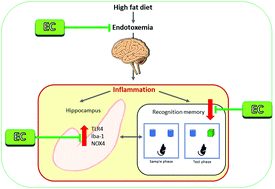(−)-Epicatechin mitigates high fat diet-induced neuroinflammation and altered behavior in mice†
Abstract
Obesity is characterized by a condition of low-level chronic inflammation that can lead to altered cognition and behavior. The flavanol (−)-epicatechin (EC) has been shown to have anti-inflammatory actions in mouse models of diet-induced obesity. This study investigated the capacity of dietary EC to mitigate hippocampal inflammation and impaired memory in high fat diet (HFD)-fed mice. Healthy 6 weeks old male C57BL/6J mice (10 mice per group) were fed for 13 weeks either: a control diet (10% total calories from fat), a high fat diet (60% total calories from fat), or the control and high fat diets supplemented with 20 mg EC per kg body weight. Short-term object recognition memory was evaluated by the novel object recognition (NOR) task and spatial memory by the object location memory (OLM) task and the Morris water maze (MWM). After 13 weeks on the dietary treatments, HFD-fed mice developed obesity, which was not affected by EC supplementation. HFD consumption caused metabolic endotoxemia, and increases in parameters of hippocampal inflammation, i.e. mRNA levels of TLR4, Iba-1, and NOX4. All these changes were mitigated by EC supplementation. EC supplementation also significantly improved recognition memory in HFD-fed mice while neither HFD consumption nor EC supplementation affected mouse spatial memory. Overall, EC supplementation prevented short-term recognition memory impairment in HFD-induced obese mice, which could be in part due to the capacity of EC to mitigate metabolic endotoxemia and associated hippocampal inflammation and oxidative stress.

- This article is part of the themed collection: International Conference on Polyphenols and Health (ICPH2019) collection


 Please wait while we load your content...
Please wait while we load your content...
